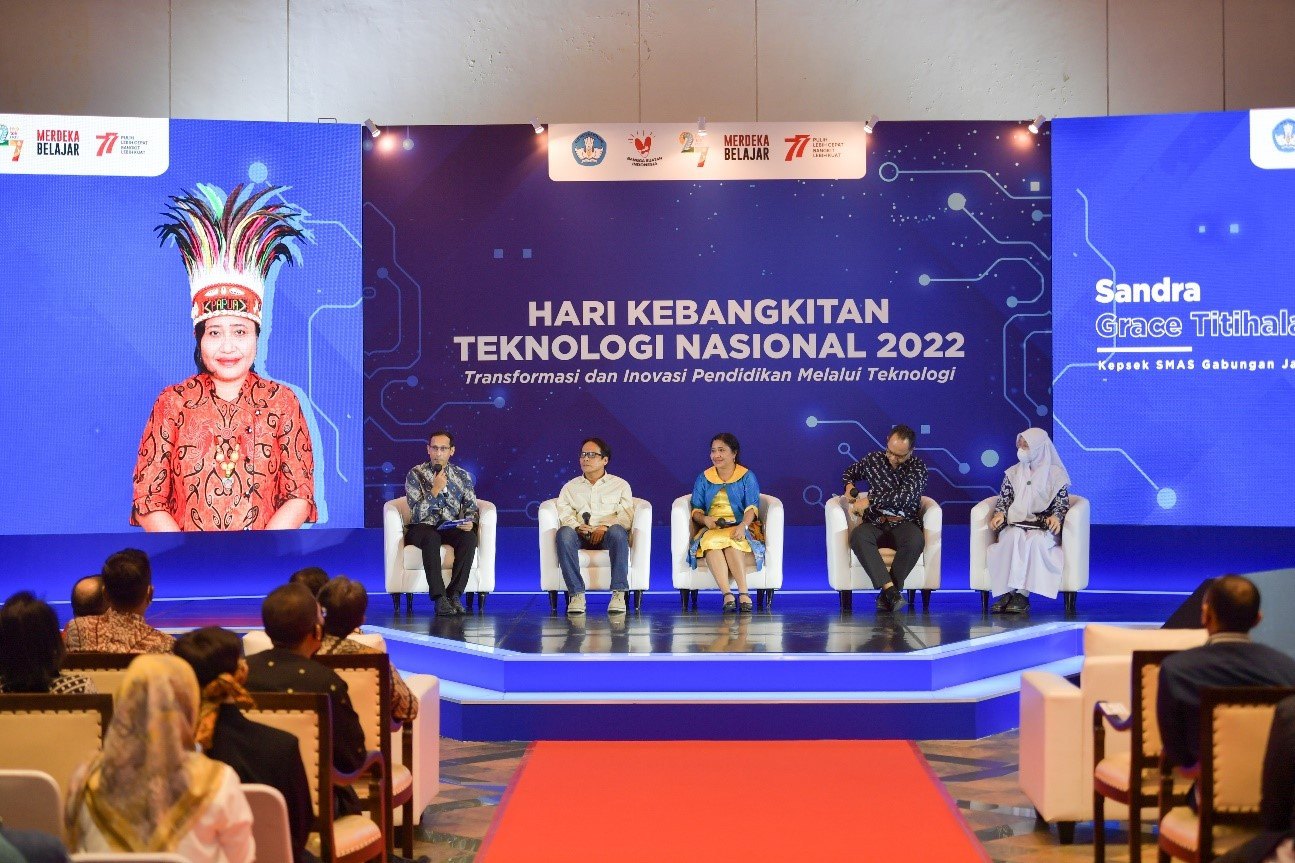Popular Reads
Top Results
Can't find what you're looking for?
View all search resultsPopular Reads
Top Results
Can't find what you're looking for?
View all search resultsTransforming education through the development of technology ecosystem
The Education, Culture, Research and Technology Ministry celebrated this year’s National Technology Awakening Day by holding a hybrid event to mark the improvement of the country’s education system in line with initiatives for the digital era.
Change text size
Gift Premium Articles
to Anyone
T
he Education, Culture, Research and Technology Ministry celebrated this year’s National Technology Awakening Day by holding a hybrid event to mark the improvement of the country’s education system in line with initiatives for the digital era. This year, the theme was “Educational Transformation and Innovation through Technology”.
Education, Culture, Research and Technology Minister Nadiem Makarim expressed gratitude to users of the ministry’s technological platform. He said that making tech platforms more accessible was among the ministry’s most important initiatives.
“Thank you to the more than 1.2 million educators who have accessed and shared material on the Merdeka Mengajar [Emancipated Teaching] platform, a channel for teachers to learn, to teach and to create and support the implementation of the Merdeka Curriculum. In addition, as many as 3.2 million educators and education offices throughout Indonesia have accessed various technology platforms with a belajar.id account," said Nadiem.
The new platform has been used by 714,000 students, 2,600 universities, 2,700 industrial partners and 43,000 practitioners. The ministry has released seven platforms: Rapor Pendidikan, Tanya Bos, Kampus Merdeka, the School Activity Plan and Budget Application (ARKAS) and the School Procurement Information System (SIPLah), along with the aforementioned Merdeka Mengajar/Belajar and belajar.id.
The Ministry has collaborated with GovTech Edu to create various platforms that help teachers, principals, education offices, students, and lecturers form a better education ecosystem.
"After six months of release, this platform application has been downloaded by more than 1.6 million users, more than 312 thousand teachers have downloaded teaching tools, more than 51 thousand proofs of work have been distributed, more than 1,000 teacher communities throughout Indonesia, and a total of 55 thousand more content is available on the Merdeka Mengajar platform,” CTO of GovTech Edu, Ibrahim Arief said proudly on the increasing ecosystem.
It was noted that technological advancement had been implemented in 500 colleges and in more than 4,000 educational institutions throughout the country, leaving a lot of room for improvement in the future. Mahir Bayasut, the head of Kedaireka said that the collaboration fund had increased from 2 trillion to 11 trillion and that users had increased by three times from the year before.
“There is no innovation without collaboration. There is no collaboration without discussion. That’s what Kedaireka is about,” said Mahir.
Through the Kedaireka program, educators have the ability to collaborate with their peers from anywhere in Indonesia.
However, it is not limited to educators. Students also have the opportunity to connect and work together, as shown by Gastya Eka Putra and Muhamad Yusuf. They presented “VokasiLand,” a virtual reality project that came to fruition based on collaboration involving students from SMK Raden Umar Said, a vocational high school in Kudus; Politeknik Negeri Batam; and Institut Seni Budaya Indonesia (ISBI) Bandung.
In a panel discussion, Nadiem described the sophisticated technology that the ministry was seeking to introduce in three words: courage, collaboration and real work. He said that in the digital world, people needed to have the courage to change. Moreover, change could only happen through collaboration among multiple stakeholders. Lastly, data was crucial in technology and to measure the success of an undertaking.
The panel discussion had the theme of “Transformation and Innovation in the Education Sector Through Technology”. With Nadiem acting as moderator, the speakers included Kaylila Talita, a student of vocational high school Raden Umar Said Kudus; Nasmur, a teacher from SMPN 7 Makassar; Sandra Grace Titihalawa, a principal of SMA Gabungan in Jayapura; and Dr. Muhammad Nur Yuniarto, a lecturer from Sepuluh Nopember Institute of Technology (ITS) in Surabaya. The panel discussed how technological advancement had changed the learning process for the better.
“We used to debate this. Is it possible for teachers, do they want to learn independently through applications? But at the time of [COVID-19], we released the online module program bit by bit. It sold out amazingly,” said Nadiem. “So, teachers throughout Indonesia, even though the perception is negative, the teacher's perception – lazy to study or something – it turns out that if given the opportunity, millions of teachers learn independently at their respective levels.”
Nadiem also pointed out that some people were not comfortable with the fact that the national curriculum seemed to change whenever a new minister came into the position. As the current minister, he stated that the Merdeka curriculum was not mandatory. However, it was encouraged by the government.
The second panel discussion had the theme of “Technology Solutions in Education in Indonesia to Recover Faster, Rise Stronger”. Widya Saputra, the host, acted as moderator, and the speakers included Director General of Teachers and Education Personnel, Iwan Syahrir, Director General of Vocational Studies, Kiki Yuliati and Director General of Higher Education, Research, and Technology, Nizam.
“One of the things we must appreciate under the leadership of the minister, and the direction of the President as well, is that since the beginning, the ministry has had a plan to solve education problems, whether it's access, be it in terms of quality or equity, through technology. And most importantly for learning,” said Iwan.










